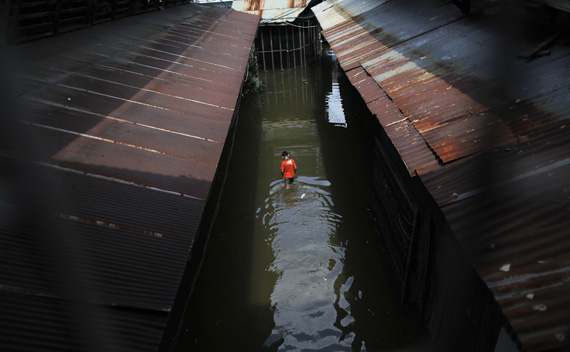The Ramifications of Thailand’s Flooding
More on:

By now, with the major flooding in the Bangkok area well into its second week, even resilient Thais are reaching their breaking point. Angry, frustrated Bangkok residents have been scuffling with police in attempts to force the government to open sluice gates and release some water from their neighborhoods (Reuters has a good summary of the problem here). Across the capital, many Thais who have not fled are finding it impossible to even reach local government officials, while the official flood emergency center actually had to move out of its offices because of flooding -- showing how unprepared it was and perhaps, poorly informed by its own meteorologists. The government has also appeared to be unprepared for the extent of the economic damage to industrial estates outside the city, which produce computer disk drives and other important electronics components.
Government officials say that, until this week, Prime Minister Yingluck Shinawatra seemed to believe that the floods would only have a minor impact on Thailand’s GDP for the year; in reality, they are going to shave several points off of GDP, and will likely make any new investors think twice about future investments in Bangkok suburban industrial estates. Japanese companies, who dominate these industrial estates, are said to be furious about the lack of preparation and feeling like they have been sacrificed by the Thai government. Japanese companies tend to stick with their investments, so they are unlikely to pull out of Thailand any time soon, but the crisis will clearly have an impact on future Japanese investment in the country, long a favorite of Tokyo.
The government’s performance in the crisis only seems to get worse. To be fair, as writers like Thitinan Pongsudhirak have noted, the flooding crisis has further pointed out the deep divisions in Thai society. Yingluck has only received grudging assistance from the military, which has the greatest assets to be deployed in a crisis, and she seems unable to trust the bureaucracy, leading to a situation in which the government does not have reliable information in the heart of a crisis. She seems to be getting incomplete information to assist in making decisions about which areas of the city to save, leading some to complain that she is trying to save industrial estates instead of residential areas.
But Yingluck has not exactly helped herself. In recent days the government seems to be getting out more accurate information, and listening better to the public’s complaints, rather than just issuing decrees. Proclaiming this week that the worst seems to be over, she may be correct – the city’s defenses have proven relatively strong – but she winds up seeming callous and uncaring. She has given the opposition Democrats plenty of ammunition to charge that she cannot lead in a crisis, and she seems unable to deal with the stonewalling and challenges she’s faced by punishing or at least threatening those who defy her – after all, she won a sizable electoral majority this summer, and could leverage that popularity against enemies.
More on:
 Online Store
Online Store